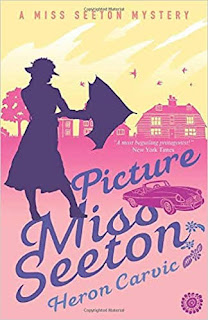Weekly Reader: Picture Miss Seeton by Heron Carvic; Average Agatha Christie Tribute With Somewhat Dull Lead
By Julie Sara Porter
Bookworm Reviews
Spoilers: Heron Carvic's Miss Seeton books are clearly a tribute to Miss Marple, the spinster amateur detective created by Agatha Christie. Carvic has all the parts right: the quaint English village, the sweet detective with a day job and a curious nosy personality, the murder with obvious clues, the gossipy villagers. Unfortunately, Carvic did not know how to put them together to make a decent first book, Picture Miss Seeton.
I am not the biggest fan of Christie's work, I apologise. There were other writers from the era such as Dorothy Sayers and Ngaio Marsh and definitely the Hard Boiled detective genre like Dashiell Hammett and Raymond Chandler, that I like better. But what I can't deny is that Miss Marple is an interesting lead. She is feisty, eccentric, even abrasive at times. She observes the people around her and is able to discern clues based on patterns of behavior, appearance, background information, and sometimes what secrets that they are hiding. She also has a kind heart that cares for others, particularly friends and relatives that are falsely accused of murder.
Miss Marple may not have been the first, but she was certainly the predecessor of many female led detective series, quite a long legacy.
I have reviewed many female led detective series for this blog, three this month alone featuring women with a lot of sass, a lot of personality, and a whole lot of deductive skills. But one of those is not Miss Seeton.
Miss Seeton has some interesting character traits. She is an art teacher who draws potential subjects, sometimes in an abstract manner (with sinister eyes and strong lines if she feels that there is something dangerous in their manner), suggesting that her deductive ability may border on clairvoyance. She weighs retirement to move to a country home inherited by a late cousin and when she arrives, she instantly becomes the target of the local gossip chain.
She stumbles on a murder in progress as a man is in the process of assaulting a woman. She valiantly fights him off with her umbrella in one of the few bright spots in the book. This reputation carries her over to her new village to the point where she is stalked.
While Miss Seeton is handy with an umbrella, she isn't much of a detective. She is unable to discern the identity of her stalker. This is the point where any detective worth their salt would do their own investigation and find their stalker themselves and confront them in a stylish scene when all of the suspects are gathered together and the amateur detective reveals exactly how they put one over the local forces by solving the mystery. Unfortunately, all of the legwork and investigations actually are done by the male police officers, making Miss Seeton nothing more than an observer or a witness in her own story.
This sets a dangerous precedent in detective literature that a woman can be the headliner and lead character,but not the actual detective. She may be at the right place at the right time and be a key observer. She may find important clues. She may even have her life in danger (as Miss Seeton does in a particularly well written and chilling confrontation.) However, when it comes to the investigation and detective work, Carvic might as well have said "Look ladies, park it and do the cozy stuff. Leave the mystery part to the big boys." The local law enforcement in a cozy mystery is supposed to be in the way or helpful to the main amateur detective, but not the ones solving the crime. Otherwisethe mystery series might as well be named for them.
It doesn't help that the mystery itself is incredibly boring as well. The suspects are obvious and its tie to the original assault/murder could be telegraphed a mile away. Carvic clearly followed the tradition of The so-called Golden Age of Detective Fiction, but he didn't make room for any originality. That genre was a suggestion, not a requirement in which all subsequent works must follow.
To have a inactive lead with a boring mystery should be the greatest writing crime of all.

No comments:
Post a Comment